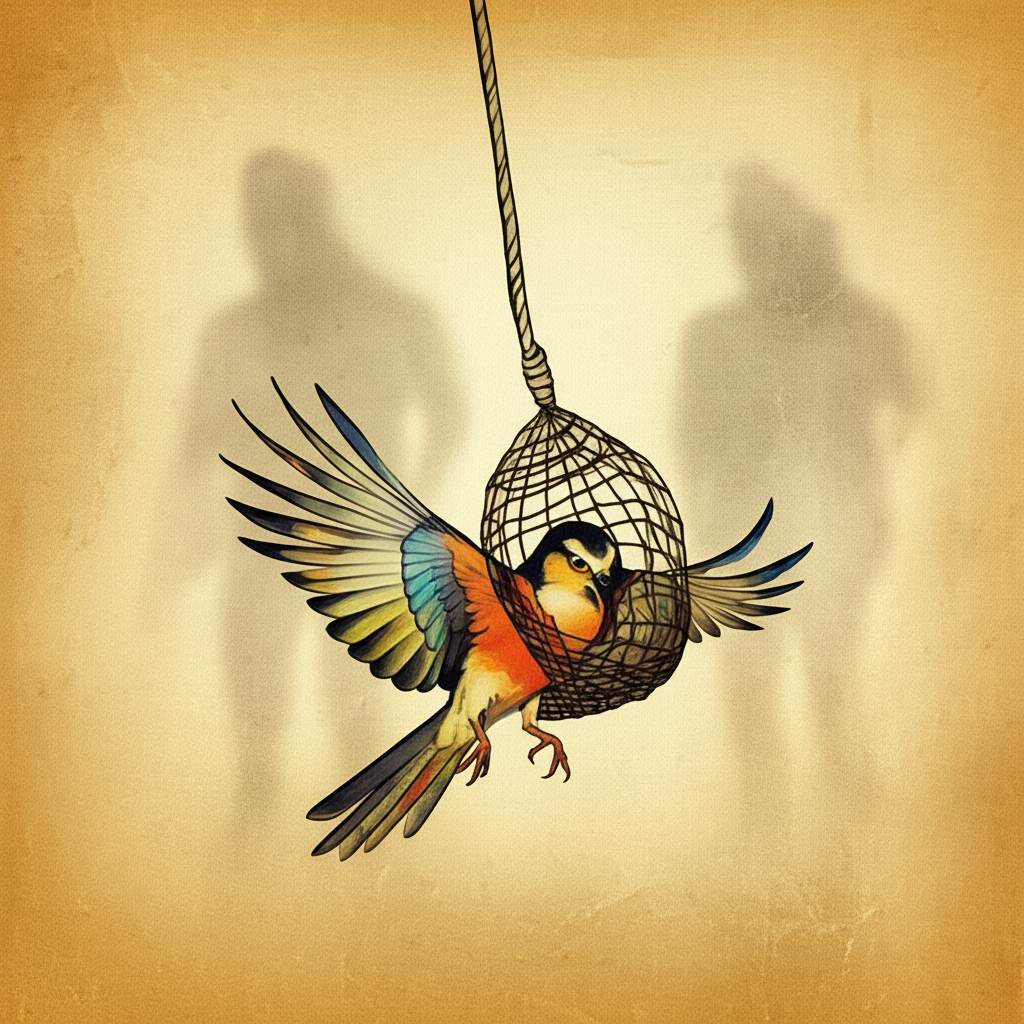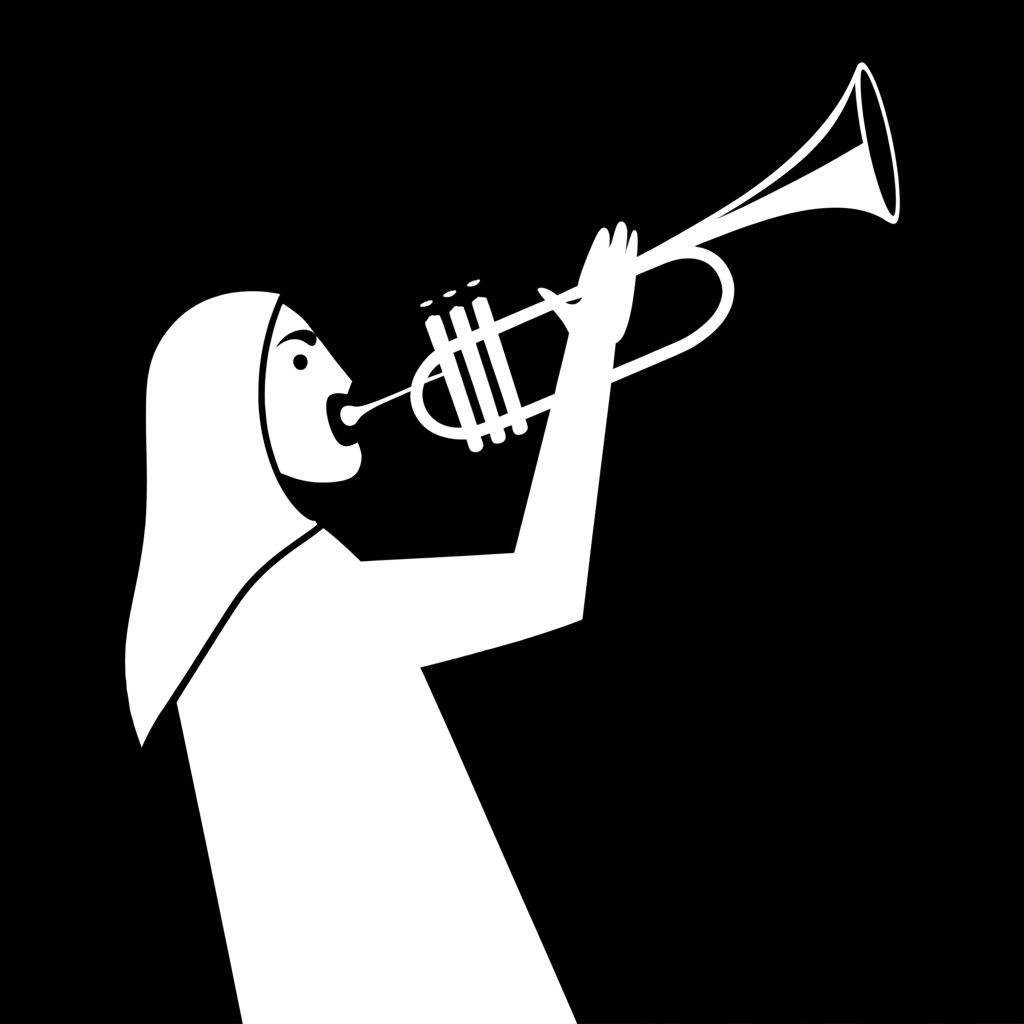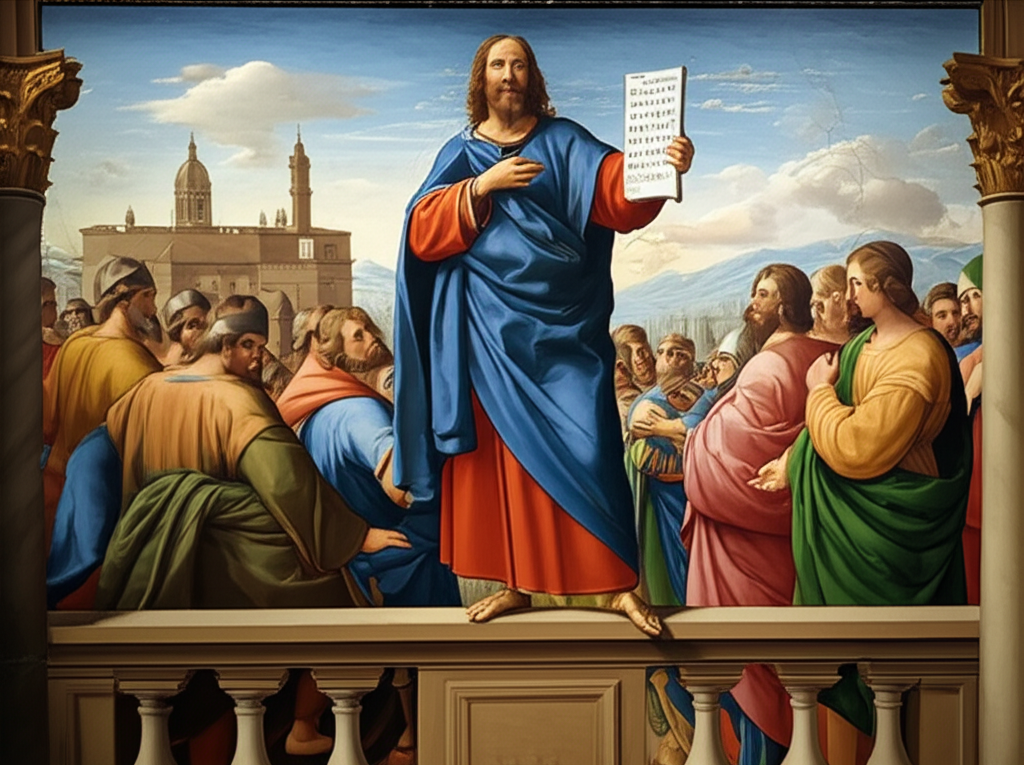Amos 3 meaning explained in AI Summary
Chapter 3 of Amos focuses on God's judgment against Israel and emphasizes the inevitability of punishment for their sins.
1. Exclusive Relationship, Exclusive Responsibility (vv. 1-2): God reminds Israel of their unique relationship with Him, chosen above all other nations. This special status, however, comes with greater responsibility and accountability for their actions.
2. Cause and Effect: Sin and Punishment (vv. 3-8): Amos uses a series of rhetorical questions to illustrate the principle of cause and effect. Just as there are consequences for natural events, there are consequences for sin. God doesn't act randomly; His judgment is a direct result of Israel's transgressions.
3. Witnesses to Israel's Sins (vv. 9-11): Amos calls upon Egypt and Philistia, Israel's neighbors, to testify against them. These nations, despite their own wickedness, are appalled by the extent of Israel's social injustice, oppression of the poor, and rampant immorality.
4. The Inevitability of Judgment (vv. 12-15): Amos uses the imagery of a shepherd rescuing a lamb from a lion's mouth to highlight the small remnant of Israel that will survive God's judgment. The destruction will be widespread, affecting even the wealthy and powerful who felt secure in their fortified homes.
Key Themes:
- Divine Justice: God is just and will not tolerate sin indefinitely. His judgment is a consequence of Israel's choices.
- Accountability: Israel's special relationship with God comes with a higher level of responsibility and accountability for their actions.
- Social Injustice: Amos condemns Israel's exploitation of the poor and vulnerable, emphasizing that true worship requires ethical behavior.
- Certainty of Punishment: Amos makes it clear that God's judgment is imminent and unavoidable for those who persist in their wickedness.
Overall Message:
Chapter 3 serves as a stark warning to Israel, emphasizing that their sinfulness has consequences. God's judgment is not arbitrary but a direct response to their persistent disobedience and disregard for His covenant. The chapter also highlights the importance of social justice and righteousness as integral aspects of true worship.
Amos 3 bible study ai commentary
Amos 3 confronts Israel with the shocking reality that their unique covenant relationship with God is the very reason for their impending judgment. The chapter unfolds like a divine lawsuit: it opens with an indictment based on their special election, proves the inevitability of God's action through a series of undeniable cause-and-effect questions, and concludes with a verdict of near-total destruction upon the symbols of their corrupt wealth and false worship.
Amos 3 Context
This prophecy was delivered during the 8th century BC, a period of unprecedented prosperity and military strength for the Northern Kingdom of Israel under King Jeroboam II. This affluence, however, masked deep-seated moral and spiritual decay. Social injustice was rampant, with the rich oppressing the poor, and worship was syncretistic and hollow, centered at the unsanctioned royal sanctuary in Bethel. Amos, a shepherd from Tekoa in the Southern Kingdom of Judah, was sent by God to pronounce judgment on the Northern Kingdom, whose people believed their election and prosperity were signs of God's unwavering favor.
Amos 3:1-2
Hear this word that the Lord has spoken against you, O people of Israel, against the whole family that I brought up out of the land of Egypt: “You only have I known of all the families of the earth; therefore I will punish you for all your iniquities.”
In-depth-analysis
- A Legal Summons: The opening "Hear this word" acts as a formal call to attention, as if in a court of law. God is the plaintiff and judge, and Israel is the defendant.
- "Whole family": This addresses both the Northern Kingdom (Israel) and the Southern Kingdom (Judah), reminding them of their unified origin in the Exodus. Though the prophecy focuses on the North, the principle applies to all of God's covenant people.
- "You only have I known": The Hebrew word for "known" is yada. This is not mere awareness but signifies a deep, intimate, and elective covenant relationship, akin to the bond between a husband and wife (Gen 4:1). It is the language of chosenness and special relationship.
- The Shocking Reversal: The connector "therefore" is the pivot of the passage. Israel expected their unique relationship to bring blessing and protection. Amos declares the opposite: because of this intimate relationship, their sin is more egregious. Privilege heightens responsibility, and their covenantal status makes their rebellion worthy of direct punishment.
Bible references
- Deuteronomy 7:6: "...the Lord your God has chosen you to be a people for his treasured possession, out of all the peoples who are on the face of the earth." (Establishes the covenant election).
- Exodus 19:5-6: "...you shall be my treasured possession... a kingdom of priests and a holy nation." (Highlights the responsibility tied to the covenant).
- Luke 12:48: "...From everyone who has been given much, much will be demanded; and from the one who has been entrusted with much, much more will be asked." (The NT principle of accountability).
- 1 Peter 4:17: "For it is time for judgment to begin at the household of God; and if it begins with us, what will be the outcome for those who do not obey the gospel of God?" (Judgment beginning with God's people).
Cross references
Jer 1:5 (yada as divine knowing), Hos 13:4-5 (God knowing Israel in wilderness), Ps 147:19-20 (God's word given only to Jacob), Rom 3:1-2 (The advantage and entrustment given to the Jews), Heb 12:6 (The Lord disciplines the one he loves).
Polemics
This is a direct polemic against the false security bred by a misunderstanding of being the "chosen people." The Israelites believed their election was a shield from consequence. Amos corrects this, teaching that election is a call to a higher standard of holiness, not a license for sin.
Amos 3:3-6
“Do two walk together, unless they have agreed to meet? Do a lion roar in the forest, when he has no prey? Does a young lion cry out from his den, if he has taken nothing? Does a bird fall in a snare on the earth, when there is no trap for it? Does a snare spring up from the ground, when it has taken nothing? Is a trumpet blown in a city, and the people are not afraid? Does disaster come to a city, unless the Lord has done it?”
In-depth-analysis
This section is a series of seven cause-and-effect rhetorical questions, each with an obvious answer, designed to lead the listener to an unavoidable conclusion.
- Verse 3: The foundational question. Israel and God cannot "walk together" because Israel has broken the covenant (the "agreement"). Their ways have diverged from God's ways.
- Verse 4: A lion’s roar signifies captured prey. The effect (roar) proves the cause (a successful hunt). God’s prophetic word of judgment (the roar) is not empty; it signifies that judgment is secured.
- Verse 5: A trap only springs for a reason (it caught something). An effect (sprung trap) points to a cause. Events are not random.
- Verse 6: A trumpet (shofar) blast signaling attack naturally causes fear. This directly links a divine warning to a human response. The final question is the theological climax: "Does disaster... unless the Lord has done it?".
- Disaster (Hebrew: ra'ah) can mean calamity, distress, or evil. This asserts God's absolute sovereignty over the affairs of the nation, including its judgment. It's not a commentary on the origin of moral evil, but on God's sovereign control over historical events, using foreign armies as His instruments of chastisement.
Bible references
- Isaiah 59:2: "But your iniquities have made a separation between you and your God..." (Why Israel cannot "walk with" God).
- Isaiah 45:7: "I form light and create darkness, I make well-being and create calamity (ra'ah); I am the Lord, who does all these things." (Affirms God's sovereignty over disaster).
- Jeremiah 6:17: "I set watchmen over you, saying, 'Pay attention to the sound of the trumpet!' But they said, 'We will not pay attention.'" (Israel ignoring the trumpet warning).
- 1 Peter 5:8: "Your adversary the devil prowls around like a roaring lion, seeking someone to devour." (Lion imagery for an enemy).
Cross references
Gen 5:24 (Enoch walking with God), Hos 11:10 (The Lord will roar like a lion), Jer 4:5 (Sound the trumpet for war), Lam 3:38 (Calamity and good from God's mouth), Eze 33:2-6 (The watchman and the trumpet).
Amos 3:7
For the Lord God does nothing without revealing his plan to his servants the prophets.
In-depth-analysis
- This verse acts as the key to interpreting the previous questions. It explains why the trumpet is sounding now.
- Plan/Secret Counsel (Hebrew: sod): This term refers to the intimate, confidential council of a king. Prophets are not outsiders; God invites them into His "heavenly council" to know His plans before He executes them. This grants their message divine authority.
- God's Modus Operandi: It establishes a principle of divine action: God graciously warns before He acts. The presence of a prophet like Amos is, in itself, an evidence of impending action.
Bible references
- Genesis 18:17: "The Lord said, 'Shall I hide from Abraham what I am about to do?'" (God revealing His plans to His friend).
- Jeremiah 23:18: "For who has stood in the council (sod) of the Lord to see and to hear his word?" (Contrasting true prophets with false ones who haven't been in God's council).
- John 15:15: "I no longer call you servants... I have called you friends, for all that I have heard from my Father I have made known to you." (Jesus revealing God's plan to his disciples).
- Revelation 1:1: "The revelation of Jesus Christ, which God gave him to show to his servants the things that must soon take place." (The principle of revelation continued).
Cross references
Ps 25:14 (The sod of the Lord is for those who fear Him), Dan 2:28 (A God who reveals mysteries), 2 Pet 1:20-21 (Prophecy's divine origin).
Amos 3:8
The lion has roared; who will not fear? The Lord God has spoken; who can but prophesy?
In-depth-analysis
- This verse provides the powerful conclusion to the chain of logic.
- Divine Compulsion: It equates the Lord’s speaking with a lion’s roar. Just as the roar irresistibly produces fear, God's word irresistibly compels the true prophet to speak.
- Amos's Defense: This is a defense of his own ministry. He is not a meddler from Judah or a political agitator. He prophesies because he has no choice. He heard the roar and is divinely commissioned and compelled.
Bible references
- Jeremiah 20:9: "If I say, 'I will not mention him or speak any more in his name,' there is in my heart as it were a burning fire shut up in my bones, and I am weary with holding it in, and I cannot." (Perfect example of prophetic compulsion).
- Acts 4:20: "for we cannot but speak of what we have seen and heard." (The apostles' compulsion to preach the gospel).
- 1 Corinthians 9:16: "For if I preach the gospel, that gives me no ground for boasting. For necessity is laid upon me. Woe to me if I do not preach the gospel!" (Paul's compulsion).
Cross references
Job 4:10-11 (Roaring of the lion silenced), Rev 5:5 (Lion of Judah).
Amos 3:9-11
Proclaim to the strongholds in Ashdod and to the strongholds in Egypt, and say, “Assemble yourselves on the mountains of Samaria, and see the great tumults within her, and the oppressed in her midst.” “They do not know how to do right,” declares the Lord, “those who store up violence and robbery in their strongholds.” Therefore thus says the Lord God: “An adversary shall surround the land and bring down your defenses from you, and your strongholds shall be plundered.”
In-depth-analysis
- Ironic Summons: Ashdod (Philistia) and Egypt were notorious enemies of Israel, often seen as archetypes of pagan corruption. God ironically calls these gentile nations to be witnesses to the judgment of His own people.
- Internal Collapse: The "great tumults" and "oppression" are not from external enemies but are internal. Israel’s society is rotting from within. The issue is profound social injustice.
- Moral Ignorance: "They do not know how to do right" is a stunning indictment. They have God's law but have become morally bankrupt, their consciences seared.
- Lex Talionis (an eye for an eye): The punishment fits the crime. They "store up violence and robbery in their strongholds," so an enemy will come, and their "strongholds shall be plundered."
Bible references
- Micah 3:1-3: "Is it not for you to know justice?—you who hate the good and love the evil, who tear the skin from off my people..." (Parallels the charge of internal oppression).
- Jeremiah 2:10-13: "Cross to the coasts of Cyprus and see... Has a nation changed its gods...? But my people have changed their glory for that which does not profit." (Gentile nations used as a benchmark for Israel's unique failure).
- 2 Kings 17:5-6: "Then the king of Assyria invaded all the land and came to Samaria, and for three years he besieged it. In the ninth year of Hoshea, the king of Assyria captured Samaria..." (The historical fulfillment of this prophecy).
Cross references
Isa 5:7 (God looked for justice, but saw bloodshed), Jer 22:13-17 (Woe to him who builds his house by unrighteousness), Rom 2:24 (God’s name is blasphemed among the Gentiles because of you).
Amos 3:12
Thus says the Lord: “As the shepherd rescues from the mouth of the lion two legs, or a piece of an ear, so shall the people of Israel who dwell in Samaria be rescued, with the corner of a couch and part of a bed.”
In-depth-analysis
- The Shepherd Metaphor: Amos, the shepherd, uses a vivid image from his own life. A shepherd might snatch a bloody, mangled fragment of a sheep from a lion, not to save the animal, but as evidence to the owner that it was killed by a predator and not negligence.
- A Pathetic Remnant: The rescue described is not hopeful. It depicts a near-total destruction. The remnant is not a saved populace but pathetic scraps—two legs, a piece of an ear.
- Symbols of Corrupt Luxury: The equivalent for the rich in Samaria is the "corner of a couch" and "part of a bed." These were the luxurious items on which they lounged while oppressing the poor. The escape will be so minimal that only broken pieces of their prized possessions will remain, proof of their complete annihilation. This is a parody of a remnant.
Bible references
- 1 Samuel 17:34-35: "But David said to Saul, 'Your servant used to keep sheep for his father. And when there came a lion, or a bear, and took a lamb from the flock, I went after him and struck him and delivered it out of his mouth.'" (A shepherd's duty to rescue).
- Isaiah 1:9: "If the Lord of hosts had not left us a few survivors, we should have been like Sodom, and become like Gomorrah." (Contrasts with a more hopeful view of the remnant).
Cross references
Exo 22:13 (Proof of death by wild animal), Amos 6:4 (Those who lie on beds of ivory), 2 Kings 17:6 (Deportation to Assyria).
Amos 3:13-15
“Hear, and testify against the house of Jacob,” declares the Lord God, the God of hosts, “that on the day I punish Israel for his transgressions, I will punish the altars of Bethel, and the horns of the altar shall be cut off and fall to the ground. I will tear down the winter house along with the summer house, and the houses of ivory shall perish, and the great houses shall come to an end,” declares the Lord.
In-depth-analysis
- Witness and Testify: The call is renewed, formalizing the judgment against the "house of Jacob."
- "Lord GOD, the God of hosts": The use of God's most powerful titles emphasizes His absolute authority and sovereign power over all cosmic and military forces to execute this judgment.
- Striking the Religious Center: The judgment targets Bethel first. This was the center of the Northern Kingdom's corrupt, syncretistic, and illegitimate worship, established by Jeroboam I to prevent people from going to Jerusalem (1 Kings 12).
- "Horns of the altar": These symbolized the power and sanctity of the altar. They were a place of asylum (1 Kings 1:50). By cutting them off, God declares that there is no power, no atonement, and no refuge in their false worship.
- Striking the Luxurious Centers: The judgment moves from the religious to the civil. "Winter house," "summer house," and "houses of ivory" were symbols of the opulent wealth the rich had acquired through injustice (Amos 6:4). God will destroy both the false religion and the corrupt social system it endorsed.
Bible references
- 1 Kings 12:28-30: "...So the king...made two golden calves...And he set one in Bethel... And this thing became a sin..." (The origin of the sin of Bethel).
- 1 Kings 2:28: "When the news came to Joab... he fled to the tent of the Lord and caught hold of the horns of the altar." (The horns of the altar as a place of refuge).
- Hosea 10:8: "The high places of Aven, the sin of Israel, shall be destroyed. Thorn and thistle shall grow on their altars..." (Another prophet declaring judgment on Bethel).
- 2 Kings 23:15: "Moreover, the altar at Bethel, the high place that Jeroboam the son of Nebat... had made, both that altar and the high place he broke down and burned..." (The historical fulfillment by King Josiah hundreds of years later).
Cross references
Jer 7:12-15 (Judgment on Shiloh as precedent for Jerusalem), Rev 9:13 (Voice from horns of the golden altar), Ps 45:8 (Ivory palaces).
Amos chapter 3 analysis
- Covenant Accountability: The central theme is that God's election is not unconditional. Intimacy with God demands holiness, and privilege increases accountability. This is a foundational theological principle for both Old and New Testament believers.
- Sovereignty in Judgment: Amos presents God as absolutely sovereign over history. Calamity is not an accident but a direct action of a just God responding to sin. He uses pagan nations as His instruments of wrath.
- Prophetic Authority and Compulsion: The prophet is not self-appointed but is a messenger from God’s inner council (sod), divinely compelled to speak His word. The message is not the prophet's opinion but a divine declaration.
- The Link Between Worship and Justice: Amos intrinsically links corrupt worship (Bethel) with social injustice (oppression). A society whose worship is false will inevitably have rotten ethics. The judgment targets both the altars and the ivory houses because they are two sides of the same coin of rebellion.
- The Gentile Witness: A key rhetorical device in the chapter is the summoning of pagan nations to witness Israel's internal corruption. This shames Israel by showing that even nations without the law could recognize their depravity. It highlights the depth of their fall from being a "light to the nations."
Amos 3 summary
God indicts Israel, declaring that their unique covenant relationship is precisely why He will punish them for their pervasive sin. Through a series of unanswerable rhetorical questions, Amos demonstrates that God’s warning is as certain as any law of nature and that he is compelled to speak it. The coming judgment will be so total that only meaningless scraps will survive, and it will strike down the centers of both their illegitimate worship (Bethel) and their ill-gotten luxury (ivory houses).
Amos 3 AI Image Audio and Video









Amos chapter 3 kjv
- 1 Hear this word that the LORD hath spoken against you, O children of Israel, against the whole family which I brought up from the land of Egypt, saying,
- 2 You only have I known of all the families of the earth: therefore I will punish you for all your iniquities.
- 3 Can two walk together, except they be agreed?
- 4 Will a lion roar in the forest, when he hath no prey? will a young lion cry out of his den, if he have taken nothing?
- 5 Can a bird fall in a snare upon the earth, where no gin is for him? shall one take up a snare from the earth, and have taken nothing at all?
- 6 Shall a trumpet be blown in the city, and the people not be afraid? shall there be evil in a city, and the LORD hath not done it?
- 7 Surely the Lord GOD will do nothing, but he revealeth his secret unto his servants the prophets.
- 8 The lion hath roared, who will not fear? the Lord GOD hath spoken, who can but prophesy?
- 9 Publish in the palaces at Ashdod, and in the palaces in the land of Egypt, and say, Assemble yourselves upon the mountains of Samaria, and behold the great tumults in the midst thereof, and the oppressed in the midst thereof.
- 10 For they know not to do right, saith the LORD, who store up violence and robbery in their palaces.
- 11 Therefore thus saith the Lord GOD; An adversary there shall be even round about the land; and he shall bring down thy strength from thee, and thy palaces shall be spoiled.
- 12 Thus saith the LORD; As the shepherd taketh out of the mouth of the lion two legs, or a piece of an ear; so shall the children of Israel be taken out that dwell in Samaria in the corner of a bed, and in Damascus in a couch.
- 13 Hear ye, and testify in the house of Jacob, saith the Lord GOD, the God of hosts,
- 14 That in the day that I shall visit the transgressions of Israel upon him I will also visit the altars of Bethel: and the horns of the altar shall be cut off, and fall to the ground.
- 15 And I will smite the winter house with the summer house; and the houses of ivory shall perish, and the great houses shall have an end, saith the LORD.
Amos chapter 3 nkjv
- 1 Hear this word that the LORD has spoken against you, O children of Israel, against the whole family which I brought up from the land of Egypt, saying:
- 2 "You only have I known of all the families of the earth; Therefore I will punish you for all your iniquities."
- 3 Can two walk together, unless they are agreed?
- 4 Will a lion roar in the forest, when he has no prey? Will a young lion cry out of his den, if he has caught nothing?
- 5 Will a bird fall into a snare on the earth, where there is no trap for it? Will a snare spring up from the earth, if it has caught nothing at all?
- 6 If a trumpet is blown in a city, will not the people be afraid? If there is calamity in a city, will not the LORD have done it?
- 7 Surely the Lord GOD does nothing, Unless He reveals His secret to His servants the prophets.
- 8 A lion has roared! Who will not fear? The Lord GOD has spoken! Who can but prophesy?
- 9 "Proclaim in the palaces at Ashdod, And in the palaces in the land of Egypt, and say: 'Assemble on the mountains of Samaria; See great tumults in her midst, And the oppressed within her.
- 10 For they do not know to do right,' Says the LORD, 'Who store up violence and robbery in their palaces.' "
- 11 Therefore thus says the Lord GOD: "An adversary shall be all around the land; He shall sap your strength from you, And your palaces shall be plundered."
- 12 Thus says the LORD: "As a shepherd takes from the mouth of a lion Two legs or a piece of an ear, So shall the children of Israel be taken out Who dwell in Samaria? In the corner of a bed and on the edge of a couch!
- 13 Hear and testify against the house of Jacob," Says the Lord GOD, the God of hosts,
- 14 "That in the day I punish Israel for their transgressions, I will also visit destruction on the altars of Bethel; And the horns of the altar shall be cut off And fall to the ground.
- 15 I will destroy the winter house along with the summer house; The houses of ivory shall perish, And the great houses shall have an end," Says the LORD.
Amos chapter 3 niv
- 1 Hear this word, people of Israel, the word the LORD has spoken against you?against the whole family I brought up out of Egypt:
- 2 "You only have I chosen of all the families of the earth; therefore I will punish you for all your sins."
- 3 Do two walk together unless they have agreed to do so?
- 4 Does a lion roar in the thicket when it has no prey? Does it growl in its den when it has caught nothing?
- 5 Does a bird swoop down to a trap on the ground when no bait is there? Does a trap spring up from the ground if it has not caught anything?
- 6 When a trumpet sounds in a city, do not the people tremble? When disaster comes to a city, has not the LORD caused it?
- 7 Surely the Sovereign LORD does nothing without revealing his plan to his servants the prophets.
- 8 The lion has roared? who will not fear? The Sovereign LORD has spoken? who can but prophesy?
- 9 Proclaim to the fortresses of Ashdod and to the fortresses of Egypt: "Assemble yourselves on the mountains of Samaria; see the great unrest within her and the oppression among her people."
- 10 "They do not know how to do right," declares the LORD, "who store up in their fortresses what they have plundered and looted."
- 11 Therefore this is what the Sovereign LORD says: "An enemy will overrun your land, pull down your strongholds and plunder your fortresses."
- 12 This is what the LORD says: "As a shepherd rescues from the lion's mouth only two leg bones or a piece of an ear, so will the Israelites living in Samaria be rescued, with only the head of a bed and a piece of fabric from a couch."
- 13 "Hear this and testify against the descendants of Jacob," declares the Lord, the LORD God Almighty.
- 14 "On the day I punish Israel for her sins, I will destroy the altars of Bethel; the horns of the altar will be cut off and fall to the ground.
- 15 I will tear down the winter house along with the summer house; the houses adorned with ivory will be destroyed and the mansions will be demolished," declares the LORD.
Amos chapter 3 esv
- 1 Hear this word that the LORD has spoken against you, O people of Israel, against the whole family that I brought up out of the land of Egypt:
- 2 "You only have I known of all the families of the earth; therefore I will punish you for all your iniquities.
- 3 "Do two walk together, unless they have agreed to meet?
- 4 Does a lion roar in the forest, when he has no prey? Does a young lion cry out from his den, if he has taken nothing?
- 5 Does a bird fall in a snare on the earth, when there is no trap for it? Does a snare spring up from the ground, when it has taken nothing?
- 6 Is a trumpet blown in a city, and the people are not afraid? Does disaster come to a city, unless the LORD has done it?
- 7 "For the Lord GOD does nothing without revealing his secret to his servants the prophets.
- 8 The lion has roared; who will not fear? The Lord GOD has spoken; who can but prophesy?"
- 9 Proclaim to the strongholds in Ashdod and to the strongholds in the land of Egypt, and say, "Assemble yourselves on the mountains of Samaria, and see the great tumults within her, and the oppressed in her midst."
- 10 "They do not know how to do right," declares the LORD, "those who store up violence and robbery in their strongholds."
- 11 Therefore thus says the Lord GOD: "An adversary shall surround the land and bring down your defenses from you, and your strongholds shall be plundered."
- 12 Thus says the LORD: "As the shepherd rescues from the mouth of the lion two legs, or a piece of an ear, so shall the people of Israel who dwell in Samaria be rescued, with the corner of a couch and part of a bed.
- 13 "Hear, and testify against the house of Jacob," declares the Lord GOD, the God of hosts,
- 14 "that on the day I punish Israel for his transgressions, I will punish the altars of Bethel, and the horns of the altar shall be cut off and fall to the ground.
- 15 I will strike the winter house along with the summer house, and the houses of ivory shall perish, and the great houses shall come to an end," declares the LORD.
Amos chapter 3 nlt
- 1 Listen to this message that the LORD has spoken against you, O people of Israel ? against the entire family I rescued from Egypt:
- 2 "From among all the families on the earth,
I have been intimate with you alone.
That is why I must punish you
for all your sins." - 3 Can two people walk together
without agreeing on the direction? - 4 Does a lion ever roar in a thicket
without first finding a victim?
Does a young lion growl in its den
without first catching its prey? - 5 Does a bird ever get caught in a trap
that has no bait?
Does a trap spring shut
when there's nothing to catch? - 6 When the ram's horn blows a warning,
shouldn't the people be alarmed?
Does disaster come to a city
unless the LORD has planned it? - 7 Indeed, the Sovereign LORD never does anything
until he reveals his plans to his servants the prophets. - 8 The lion has roared ?
so who isn't frightened?
The Sovereign LORD has spoken ?
so who can refuse to proclaim his message? - 9 Announce this to the leaders of Philistia
and to the great ones of Egypt:
"Take your seats now on the hills around Samaria,
and witness the chaos and oppression in Israel." - 10 "My people have forgotten how to do right,"
says the LORD.
"Their fortresses are filled with wealth
taken by theft and violence. - 11 Therefore," says the Sovereign LORD,
"an enemy is coming!
He will surround them and shatter their defenses.
Then he will plunder all their fortresses." - 12 This is what the LORD says: "A shepherd who tries to rescue a sheep from a lion's mouth
will recover only two legs or a piece of an ear.
So it will be for the Israelites in Samaria lying on luxurious beds,
and for the people of Damascus reclining on couches. - 13 "Now listen to this, and announce it throughout all Israel, " says the Lord, the LORD God of Heaven's Armies.
- 14 "On the very day I punish Israel for its sins,
I will destroy the pagan altars at Bethel.
The horns of the altar will be cut off
and fall to the ground. - 15 And I will destroy the beautiful homes of the wealthy ?
their winter mansions and their summer houses, too ?
all their palaces filled with ivory,"
says the LORD.
- Bible Book of Amos
- 1 Judgment on Israel's Neighbors
- 2 Judgment on Judah
- 3 Israel's Guilt and Punishment
- 4 Israel Has Not Returned to the Lord
- 5 Seek the Lord and Live
- 6 Woe to Those at Ease in Zion
- 7 Warning Visions
- 8 The Coming Day of Bitter Mourning
- 9 The Destruction of Israel